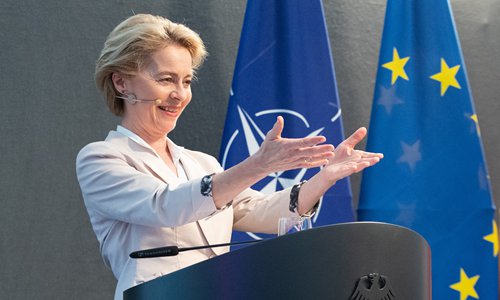
Photo: IC
German Defense Minister Ursula von der Leyen was nominated president of the European Commission on July 2 after three days of intense negotiations among EU members. Some consider it a "surprise" nomination, but two reasons can explain the EU's choice.
Von der Leyen is a female politician deeply trusted by German Chancellor Angela Merkel and she is highly proficient in English and French. She is considered one of Brussels' elite with broad international vision and capability. She has also raised seven children, making her appealing to conservative forces inside the European Union.
Traditionally, European Commission presidential nominees must win the support of both France and Germany. Von der Leyen is so far the only candidate who meets this requirement. There hasn't been a German candidate for the commission role since 1967, but Merkel has insisted the next president must be German. French President Emmanuel Macron, who has advocated European renaissance, wanted a new EU leader who can make a difference.
The leading front-runner, Manfred Weber from the European People's Party, failed to gain France's support. Frans Timmermans, from the Party of European Socialists, was met with opposition from Eastern European countries. Michel Barnier, European chief negotiator for Brexit, was seen as a hardliner and rejected by Macron.
By supporting Von der Leyen, Macron was able to nominate IMF head Christine Lagarde, who is French, as president of the European Central Bank. With this "horse trading," it is not surprising that France and Germany now both supported Von der Leyen.
The nominee has assembled a team to stand for election at the European Parliament on Tuesday. However, the German Social Democrats and Greens have voiced opposition to her bid. Her election is still not certain.
After assuming office, Von der Leyen's policy views might be different from those of her predecessor Jean-Claude Juncker. Their divergences lie mainly in European defense. Juncker has been pushing to develop an EU defense capability independent of the US-led NATO alliance, while Von der Leyen is hesitant to increase European countries' financial burdens in pursuit of independent defense. She may deepen defense cooperation with the US under the NATO framework to reduce EU defense spending.
Von der Leyen is an "Atlanticist." As the German defense minister, she has built solid relations with Washington. Hence, she may strengthen EU-US defense cooperation, and slow the pace of the EU seeking defense independence.
Von der Leyen has previously voiced tough views toward China, but China-EU relations will not change dramatically if she becomes the new European Commission president.
EU policies are largely decided by the European Council, with Franco-German consensus as the key drive behind European policies. While Von der Leyen is entitled to her own views toward China, any major policy adjustment toward China will be decided by EU member states.
Besides, since the Greens won the European Parliament and German national elections, Von der Leyen must make a difference in climate change after taking office.
The US will officially leave the Paris Agreement in November 2020. China will be the EU's most significant partner on climate issues. China and the EU need to work together to promote global climate governance. On the other hand, China-EU climate cooperation will also help boost bilateral trust and understanding. In this regard, Von der Leyen will likely be China's partner, even more so than Juncker, in the fight against climate change.
In the latest trade spat between the US and the EU, the administration of Donald Trump has proposed placing tariffs on an additional $4 billion of imports from the EU. If the tariffs are implemented, Europe-US ties are bound to deteriorate. Foreign trade accounts for over 50 percent of Germany's GDP, so new tariffs from Washington would prove fatal for the German economy. The EU, especially Germany, would then rely more on the Chinese market.
Shi Zhiqin is executive dean of the Institute of the Belt & Road Initiative and vice chairman of the Center for China-EU Relations at Tsinghua University. He Yun is a visiting researcher at Tsinghua's Institute of the Belt & Road Initiative and an assistant professor at Hunan University's School of Public Management. opinion@globaltimes.com.cn
